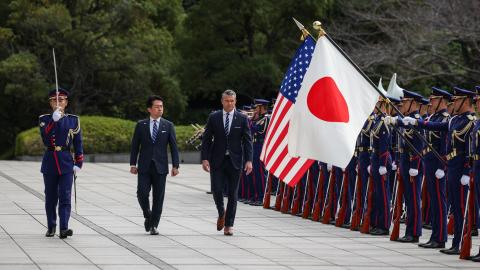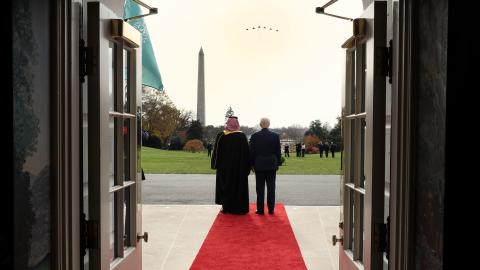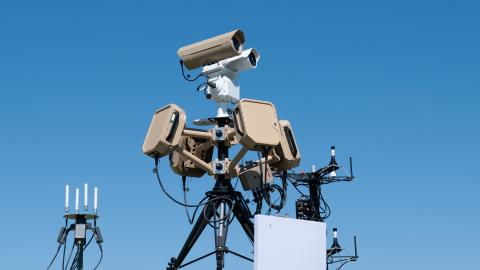It’s put-up or shut-your-tweet time for the president. He has been promising to Make America Great Again by replacing free trade with protectionism, and now has enough opportunities to do just that in cases involving aircraft, dishwashers, solar panels, steel and cars from Korea and, of course, trade with Mexico and Canada.
And there should be no excuses: The president’s power to act in trade matters without approval of Congress is far greater than in the case of health care, the wall for which Mexico will (supposedly) pay, tax reform, and immigration. Given those failures, the president needs a win, a promise kept. Trade is the place he can find it.
Start with the North American Free Trade Agreement (NAFTA). American, Canadian, and Mexican negotiators are working on revisions to the 23-year-old agreement, which Trump calls “the worst trade deal” ever signed by the United States. He is still threatening to pull out of the pact, but most believe he is playing “bad cop” to improve the bargaining power of his negotiating team.
Trump wants to reduce America’s $64 billion trade deficit with Mexico by increasing the portion of automobile components produced in the United States.; pushing up factory wages in Mexico from their current level of between $1 and $4.50 per hour; and ending the use of international arbitration panels to resolve disputes. Canada wants the revised NAFTA to include “progressive” clauses dealing with climate change, indigenous rights, and gender equality. Mexico, its inbound foreign investment falling as a result of the uncertainty surrounding the outcome of the negotiations, just wants the talks concluded quickly, with as little damage as possible to its economy.
Ironies abound. American negotiators are pasting entire passages of the Trump-scuttled Trans-Pacific Partnership (TPP) agreement into their proposed new NAFTA draft.
American businessmen, the supposed beneficiaries of a “fairer” NAFTA, claim that it would hurt American trade if the Trump team manages to negotiate an end to the use of international dispute arbitration panels.
Farmers are supposed to hate the agreement as it’s now written, and those in the Southeast do. Fruit and vegetable growers in Florida and other southeast states say they can’t compete with unfair competition from Mexico—domestic production of tomatoes is down 11 percent while imports from Mexico have quadrupled. But farmers in the Midwest grain belt love NAFTA: They have seen their sales of soybeans and wheat to Mexico quadruple. Both regions are Trump country.
Trump’s opportunity to redeem his promise to move the international trading system in a protectionist direction is created by more than just NAFTA Mark II. It was a mere three months ago that the president, looking into the eyes of British Prime Minister Theresa May, promised “a trade deal which will be a very, very big deal, a very powerful deal.” But Trump’s Commerce department last week slapped preliminary 219.63 percent (the precision is reassuring, I suppose) countervailing duties on the new C Series 110-to-130 seat aircraft manufactured by Canada’s Bombardier, that firm’s challenge to the Airbus/Boeing duopoly.
Delta’s order for 75 of these planes triggered the Boeing complaint. Boeing says Bombardier is selling aircraft here in America at “absurdly low prices . . . a classic case of dumping.” The U.S. International Trade Commission (ITC) will now decide what permanent penalties to recommend to the president; meanwhile, the new higher tariffs are in effect, and Bombardier’s share price has taken a hit on the order of 8 percent.
This matters to Prime Minister May because perhaps 1,000 of the 4,500 jobs at Bombardier’s plant in Northern Ireland are now stake. So she can be forgiven for wondering what her new best friend has in store when they sit down to negotiate that “very powerful” U.S.-UK trade deal. Meanwhile, she will join the Canadians in trying to persuade Trump to reject any tariffs that favor Boeing, which, after all, was at one time attacked by Trump for the high cost of the Air Force One jets it is producing for his use. Canadian Prime Minister Justin Trudeau has threatened that he will not close a $5.2 billion deal to buy F-18 fighters from Boeing if it does not withdraw its complaint.
Hypocrisy abounds. Boeing complains that Bombardier received subsidies from both the Canadian and UK governments, which it did. But the Cato Institute, a Washington think tank, ranks Boeing as America’s number one recipient of corporate welfare, and the World Trade Organization has found that Boeing benefited from billions in illegal state subsidies.
Irony abounds, too. If the duties are levied, the 180 million customers, mostly Americans, who fly Delta every year will pay more for their tickets. And as many as 22,000 “good-paying manufacturing jobs”—to use the president’s description—will be at risk in Kansas and West Virginia, where parts for the Bombardier aircraft are manufactured.
Then there are solar panels. The ITC, in response to complaints from SolarWorld America and Suniva, has ruled unanimously that America’s $29 billion solar industry is being damaged by cheap solar panels imported from China, South Korea, and Mexico. The complainants want Trump to set import duties of 40-cents per watt on panels than now sell for about 32-cents, more than doubling the U.S. price of imported panels.
Here’s some more irony: First Solar, the largest U.S. company in the industry, manufactures panels in Malaysia using a different technology from the one to which any tariff would be applied. It would then increase exports to the U.S. at prices below what American manufacturers charge, gaining the business our manufactures are assuming will be theirs once tariffs are imposed. And be careful what you wish for: America’s solar-installation industry is much larger than the our solar-panel manufacturing industry, and has used cheap imported panels to fuel a boom in construction of giant solar farms and (subsidized) rooftop systems. High tariffs that raise the cost of panels threaten the viability of some solar projects and by extension employment in that industry.
Trump will also have an opportunity to pursue his protectionist agenda when he responds to Whirlpool’s request for tariffs on washing machines made by South Korea’s LG and Samsung. That complaint might get handled by the president as part of a renegotiation of the “horrible . . . job-killing” trade deal with South Korea (KORUS FTA): imports of steel and autos have driven the U.S. goods deficit with South Korea from $13 billion to $28 billion during the five years in which the pact has been in effect. (Though that deficit has been offset in part by a $10 billion trade surplus in services, such as travel and intellectual property.) Irony: Trump might get the trade restrictions he wants, but at the price of the goodwill of a nation he needs to keep on-side in his confrontation with North Korea.
Given the president’s inability to deliver on other promises, “saving American jobs” is an increasingly attractive deliverable. Absent another irony: higher tariffs have knock-on effects that destroy jobs, as George W. Bush’s tariffs on cheap steel and Barack Obama’s tariffs on cheap tires are alleged to have done. Trump’s protectionism just might have the unintended consequence of destroying American jobs.
To borrow a line from The King and I, the president might protect many American workers out of all they own.
















